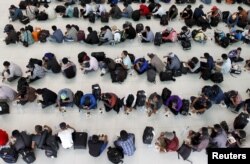Cambodians who were forced to work in slave-like conditions aboard Thai fishing boats filed a complaint in a U.S. federal court against two American companies and their Thailand-based suppliers.
The complainants, two women and five men, were recruited by Bangkok-based Phatthana Seafood Co. Ltd. between 2010 and 2012 and faced "forced labor, involuntary servitude and peonage" at the hands of their employer, said their lawyers, who filed the case in California's Central District Court last month.
U.S. companies cited in the case sell shrimp and other seafood to large North American chain stores, such as Walmart. The case also targets Thai firm S.S. Frozen Food and California-based Rubicon Resources and Wales & Co. Universe Ltd.
Agnieszka Fryszman, an attorney with Cohen Millstein law firm, told VOA Khmer that her clients' employer deducted an excessive amount of money from their paychecks for expenses.
"They were working long hours and because of all the deduction to their pay for the tools and the housing, and the van, they ended up not having enough money to eat," Fryszman said.
"The conditions were bad," she added. "And I think the extra tragedy is the people are worse off than when they returned home. After having worked so hard for a year or more, they didn't make any money and were further in debt when they returned home."
Desperate, poor
Because they could not afford to buy food, Fryszman said, some workers resorted to eating dead fish that washed up near their shacks, which were overcrowded and flooded when it rained.
Keo Ratha, one of the complainants, was recruited from Cambodia's Pursat province by Phnom Penh-based recruitment agency CDM Manpower. Convinced he would earn a higher income in Thailand, he sold his motorbike to pay for a passport and incurred debts to pay the recruitment fees, agreeing to pay it off out of his future earnings.
After arriving in Thailand in October 2011, he was exposed to job-site chemicals, such as chlorine, which damaged his health. In the lawsuit, he said he was never paid the $250 per month he was promised, receiving only $135 before rent and other deductions.
Ratha's ordeal ended in January 2012 when media reports emerged of his plight.
"What happened to me was wrong," Ratha said in a statement released by his attorney. "I filed this suit so companies would think twice before exploiting trafficked workers in the future and to help the workers who were exploited with me."
Sem Kosal and Sophea Bun were living in Battambang when CDM Manpower recruited them to work for Phatthana. They left Cambodia in December 2010 and returned in July 2012. Despite working hard, they barely had any money, the complaint said.
They could not afford medicine when their children fell ill, and without their grandparents, the children would have starved.
Reported themselves to police
Yem Ban and his wife, Nol Nakry, from Kampot province were recruited to work in Thailand in 2011 and were deported in 2012.
With hard-working conditions and insufficient food, they decided to report themselves to Thai police as undocumented workers because the company refused to return their travel documents and identification.
Phan Sophea from Battambang was recruited to work in 2010 and returned in October 2012. Sophea took out a loan to finance the costs.
In Thailand when his mother died, Sophea was not allowed to attend the funeral unless he could deposit almost $200 to get his passport back. He returned home in debt and poor health from handling chlorine without adequate protection.
The final victim in the complaint, Sok Sang from Kampot, was recruited to work for Phatthana in May 2011 and returned in April 2012.
"I have an enormous amount of respect for the plaintiffs in this suit," attorney Fryszman said. "They are wonderful, dignified people. They are so hard working. They are lovely, decent people who didn't deserve what happened to them, and I'm impressed with their courage for being willing to step up for themselves and for all other fellow citizens."
This report was produced in collaboration with VOA's Khmer Service.






